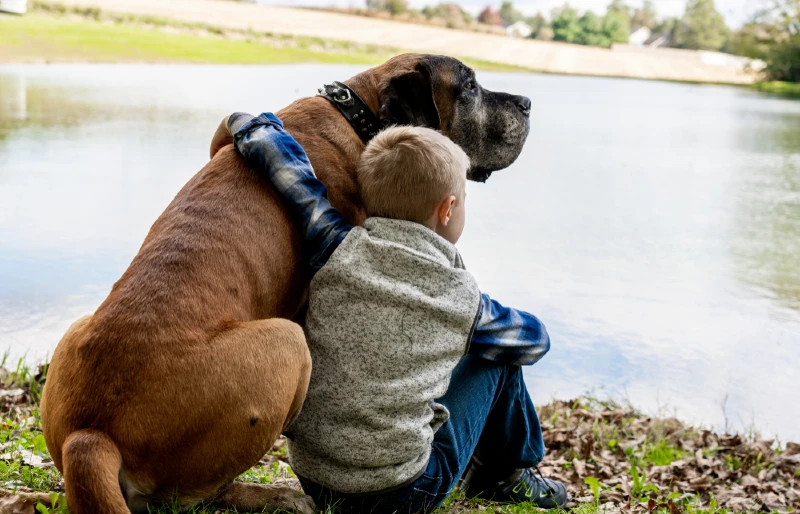16 English Mastiff Pros & Cons You Should Know
Updated on

Click to Skip Ahead
The English Mastiff is one of the biggest breeds in the world and, not surprisingly, one of the strongest. Bred to hunt for millennia, English Mastiffs today are more pet than hunter, although their innate instincts are still nearly as strong as when they were chasing down animals all day.
Owning an English Mastiff has pros and cons, and it’s best to learn them all before adopting one of the massive pups. Read on to discover them all and decide whether an English Mastiff is the dog for you!
The 9 English Mastiff Pros
1. English Mastiffs Make Excellent Guard Dogs
Few breeds are better at being guard dogs than the English Mastiff. First of all, they’re huge dogs, and just the sight of them is enough to send most criminals running away in fear. Also, your typical English Mastiff is incredibly protective of their family members and would gladly give up their lives to protect and defend them.
They don’t bark a lot, but if your English Mastiff is barking, you can be sure something notable is happening. If it’s a guard dog you seek, an English Mastiff will be perfect.

2. Grooming an English Mastiff Is Relatively Easy
While it’s true that English Mastiffs tend to shed more than other dogs due to their double fur coat, grooming one is relatively easy. That’s because they only need to be brushed once or twice a week and bathed once every 2 months or so. English Mastiffs shed a bit more twice a year, and during this time, you might need to brush them more frequently.
3. Most English Mastiffs Are Calm and Gentle
What many people find surprising about English Mastiffs is that, when they inevitably mature, they’re usually calm and gentle. That’s especially true if your English Mastiff is raised by you as a puppy and socialized from day one.
A well-socialized English Mastiff will get along with everyone in your family, including other dogs, cats, and anyone else in your circle of friends. Most English Mastiffs love spending quality time with all their family members relaxing indoors, and they don’t get aggressive very often.
4. It’s Relatively Easy to Train an English Mastiff
One of the best traits of the English Mastiff is that, as big and imposing as it is, the breed is relatively easy to train. English Mastiffs live to please their pet parents and, if learning a new skill or command, will learn it quickly to make you happy.
English Mastiffs also have a very high food drive, and using treats to train them is a very successful method. Treats also help you control your English Mastiff, especially once they start reaching their adult weight. It’s worth noting, however, that English Mastiffs can be stubborn and sensitive to negativity and yelling. For that reason, dog experts recommend using positive reinforcement with an English Mastiff.

5. Most English Mastiffs Are Calm and Gentle
What many people find surprising about English Mastiffs is that when they inevitably mature, they’re usually calm and gentle. That’s especially true if your English Mastiff is raised by you as a puppy and socialized from day one.
A well-socialized English Mastiff will get along with everyone in your family, including other dogs, cats, and anyone else in your circle of friends. Most English Mastiffs love spending quality time with all their family members relaxing indoors, and they don’t get aggressive very often.
6. English Mastiffs Are Loyal to Their Core
Few dogs exhibit the type of loyalty an English Mastiff does naturally. Once bonded to you and your family members, your English Mastiff will stay by your side through thick and thin. Also, heaven help anyone who dares to accost or attack you while your English Mastiff is nearby.
7. The Average English Mastiff Is Great With Children
You’ve never seen a dog as gentle with children as the English Mastiff, which is surprising to many people considering how incredibly large they are. Still, many pet parents have noted that their English Mastiff is as gentle and caring with children as it is with its own puppies.
Another excellent trait of the English Mastiff is that it is highly tolerant of childish behavior, including pulling, tugging, and wrestling. That’s good because, as big as they are, an English Mastiff could easily hurt a child. However, the chance that they would ever hurt your child on purpose is incredibly low.

8. Most English Mastiffs Are Quiet and Bark Infrequently
To look at an English Mastiff, you would immediately assume that, when they bark, you can hear it far and wide. While it’s true that their bark is exceedingly loud, the good news is that the typical English Mastiff barks infrequently. Most are content to relax quietly and hang out with their owners, barking only if there’s a genuine need to do so.
9. Most English Mastiffs Would Rather Socialize Than Play
If, for whatever reason, you aren’t the most active person, owning an English Mastiff will be a bit easier than many other breeds. The reason why is that your typical English Mastiff would rather socialize with you and hang out than, for example, play fetch, catch a frisbee, or run around in the yard. Yes, English Mastiff puppies are down for playtime, but as they age and mature, most will be content relaxing rather than socializing.
The 7 English Mastiff Cons
1. English Mastiffs Drool Excessively
There is no denying that the typical English Mastiff drools a lot. For some people, that’s not a big problem, but for others, the drool and mess it makes can be a rather big turn-off. That’s especially true if your English Mastiff is drooling on your clothing, furniture, and neighbors. Most English Mastiff owners keep a drool towel handy for this very reason.

2. Transporting an English Mastiff Can Be Difficult
Have you ever tried to lift 150 or 200 pounds of anything? If you have, you know it’s not easy and usually requires at least two people. Since your typical English Mastiff weighs between 150 and 200 pounds, lifting, transporting, and taking them to the veterinarian (or anywhere else) can be a real chore.
Indeed, if you have a small car, it might not even be possible.
3. English Mastiffs Are Prone to Health Issues
Like all large dog breeds, English Mastiffs are prone to several health issues. One of the worst is hip dysplasia which can affect their ability to walk and, over time, become quite painful. Unfortunately, hip dysplasia is far from the only health issue that affects the average English Mastiff. Below is a list of the most common health conditions and issues you might see with yours.
- Seasonal allergies
- Eye anomalies
- Heart disease
- Cancer
- Von Willebrand’s disease
- Degenerative myelopathy
- Epilepsy
- Hygromas (fluid-filled swelling around the elbows)
- Hip and elbow dysplasia
- Arthritis
- Congestive heart failure
- Glaucoma
- Cataracts
- Progressive Retinal Atrophy (PRA)
- Hygromas (Fluid-filled swelling around the elbows.)
- Bloat

4. It’s Expensive to Own an English Mastiff
One of the biggest cons of owning an English Mastiff is that they’re expensive dogs to care for. English Mastiffs demand exceedingly high-quality food loaded with protein, vitamins, minerals, and other nutrients. Yes, all dogs need high-quality kibble, but English Mastiffs genuinely need the best to stay healthy and happy.
Also, it’s expensive to adopt an English Mastiff. If you use a reputable breeder, you will likely pay between $1,000 and $1,500 for an English Mastiff puppy but could also spend upwards of $3,000. Lastly, English Mastiffs tend to suffer from a large variety of health issues, and as they get older, caring for them can become expensive.
5. Most English Mastiffs Have a High Prey Drive
One of the most significant issues you’ll likely have when owning an English Mastiff is that they have a high prey drive and tend to run after any small animal they don’t know intimately. If you have other pets at home, socializing them with an English Mastiff can be difficult, especially if the dog is already an adult.
6. English Mastiffs Shed a Lot
English Mastiffs have a very short, dense double coat of fur. Therefore, they tend to shed more than some dogs but much less than others. English Mastiffs shed more twice a year, usually in spring when they lose their winter coat and in fall when they grow back the same coat.
The biggest issue is that they’re so big and, with that size, comes an oversized coat and thus more fur to shed. The good news is that brushing your English Mastiff once or twice a week can easily control their shedding and keep your home from becoming a fur-filled mess.

7. English Mastiffs Usually Don’t Live Long Lives
One of the saddest cons about English Mastiffs is that they don’t live long lives. It’s rare for an English Mastiff to live more than 10 years, and most don’t even make it to that age. That’s typical of large breed dogs, of course, and the English Mastiff is one of the largest. One thing is certain if you adopt an English Mastiff; you need to cherish every moment because they get old faster than many breeds.
Final Thoughts
Did any of the pros or cons of the English Mastiff surprise you? Some of them sure surprised us! For example, the English Mastiffs’ gentle nature is a definite plus, but we could do without all the drooling. They take a great deal of effort to care for but give back a lot of love, loyalty, and sloppy dog kisses in return. If you adopt an English mastiff, it will change your life in more ways than you can imagine!
Featured Image Credit: Waldemar Dabrowski, Shutterstock












